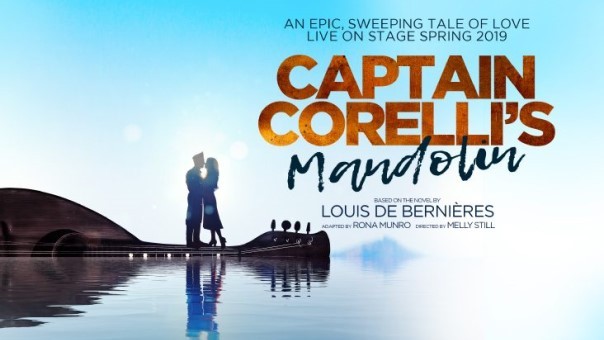With perpendicular wooden beams running the depth and width of a barren stage, above which copper-coloured sheets of metal rise from a herb-strewn rock to the “virgin light” of a Cephalonian sunset like crumpled love letters, Mayou Trikerioti’s minimal set like the inventive direction of the Tony and Olivier-nominated Melly Still is simple but striking.
As are Dom Baker’s barbed wire-etched projections which together with Malcolm Rippeth’s explosive lighting juxtapose the horrors of war with the Romeo and Julie-like love affair between the eponymous musician-turned-“soldier by mistake” (Alex Mugnaioni) and the aspiring doctor-turned-snail catcher Pelagia (Madison Clare) whose life like that of her father Dr Iannis (Joseph Long) and fiance Mandras (Ashley Gayle) is turned upside down when enemy troops occupy their idyllic island following the Greco-Italian War.
In the first major stage adaptation of Louis de Bernières’ 1994 novel of the same name, which after completing a six-venue tour is transferring to the Harold Pinter Theatre for a nine-week run, Scottish dramatist Rona Munro (The James Plays, Bold Girls) has penned an epic script which for the most part is taut, funny and engaging, but towards the end of a drawn-out second act suffers from a lack of dramatic tension.
Primarily because the tone is predominantly light and the play falls short of what the novelist hoped for in the programme notes: “The important thing is that people feel moved.” Unfortunately, the relationship between the mandolin-plucking captain and his chicken-plucking lover is more playful than passionate. Which is no fault of the actors, nor indeed the 15-strong ensemble who to a man, woman and goat (Luisa Guerreiro) are impressive, but more down to the adaptation which after a teasing climax to the opening act accelerates their “madness” of love too fast and with minimal friction.
The most emotionally-charged relationship, in fact, being the fleeting one between Carlo (Ryan Donaldson) and his fellow soldier Francesco (Fred Fergus) who at a different time and in a different place might have been able to express their feelings more freely. But the fact that they are unable to do so until “the world is different” heightens the drama. Another more riveting relationship being that between Pelagia and Mandra, the latter of whom is initially dismissed by his future father-in-law as being too young and ill-educated before war transforms him from a peasant fisherman to a patriotic fighter.
That said, there is much to like in this co-production between Birmingham Repertory Theatre and Church & State Productions. Particularly the ever-inventive direction of Melly Still which is elevated by George Siena’s military-inspired choreography. The most memorable scene featuring Carlo and Francesco trapped in a spider’s web of long narrow sheets drawn from military bags through which dead soldiers emerge as if frozen under iced trenches.
And to puncture the brutality of what Carlo and later the village strongman Velisarios (Stewart Scudamore) refer to as “f**k the war”, there is a stream of well-placed one-liners more often than nought from Mandra’s demonstrative mother Drosoula (Eve Polycarpou) whose philosophy on love that it “enters by the eyes and also leaves by the eyes” runs counter to Pelagia’s whose heartstrings are plucked by “the person, not the body”. Though it is her father’s poignant reflections which hold the greatest weight: “love is what is left when passion burns away”.
- REVIEW: Orphans @ Edinburgh King’s Theatre
- 13th April 2022
- REVIEW: Everybody’s Talking About Jamie @ Edinburgh Festival Theatre
- 30th March 2022
- REVIEW: Sheila’s Island @ Edinburgh King’s Theatre - 2nd March 2022











